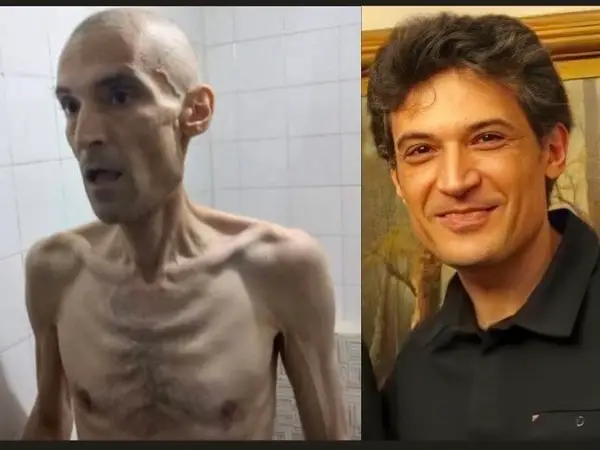Social media has exploded with concerns about long-time Iranian political prisoner and physician Farhad Meysami, emaciated over long and repeated hunger strikes.
Many Iranian dissident figures and foreign officials have expressed outrage and concern over his deteriorating health condition. A photo of Meysami along with a letter from Rajaei-Shahr prison in Karaj were published on social media Thursday, showing him in a horrible state after losing weight.
According to his lawyer, the 53-year-old prisoner of conscience, who has been in jail since 2018 for supporting women activists protesting against the mandatory Islamic dress code – or hijab -- began his hunger strike on October 7 to protest recent government killings of demonstrators.
"My client Farhad Meysami’s life is in danger,” tweeted lawyer Mohammad Moghimi. "He went on hunger strike to protest the recent government killings in the streets," he said, adding that Meysami had lost 52 kg (115 lb). Images of Meysami show him curled up on what looks like a hospital bed, and another standing, his ribs protruding.
In reaction to the photos, Washington's special envoy for Iran Robert Malley tweeted, "Shocking images of Dr. Farhad Meysami, a brave advocate for women's rights who has been on hunger strike in prison.” "Iran's regime has unjustly denied him and thousands of other political prisoners their rights and their freedom. Now it unjustly threatens his life."
German politician Hannah Neumann, who is serving as a Member of the European Parliament, said, “We have to throw a lifeline to people such as Farhad Meysami, not to the IRGC terrorists or the current regime,” referring to the European Union’s decision not to greenlight a recent resolution by the parliament that has called for the designation of the Revolutionary Guard as a terror outfit.
Canada-based activist Hamed Esmaeilion who has so far organized several rounds of worldwide protest rallies against the Islamic Republic, said that Meysami and many others do not belong in prison. He added that the regime is responsible for his life.
Esmaeilion’s wife and daughter were killed in 2020 when Iran’s Revolutionary Guard fired two missiles at a Ukrainian jetliner taking off from Tehran and all 176 people onboard died in the crash.
Women’s rights activists Masih Alinejad highlighted, “To those who think Iran’s uprising is over and Iranians have given up, behold the enormous courage of political prisoner Farhad Meysami. He’s been on a four-month hunger strike against the execution of political prisoners and forced hejab (hijab). Iranians knows that history is one our side.”
Sportsman-cum-civil rights activist Ali Karimi said, "Maysami 's photos are shocking. Images similar to the Nazis' Auschwitz crimes. This is the death camp of the Islamic Republic. Mullah’s regime is a shame for humanity."
Exiled prince Reza Pahlavi also reacted to the photos, saying “The emaciated body of Farhad Meysami is another symbol of the boundless cruelty of the Islamic regime.
He should stay alive and enjoy a free Iran in the future with his skin and flesh; an Iran where no one is imprisoned or forced to go on a hunger strike because of their beliefs and opinions, Pahlavi wrote in a tweet. “I believe that these days, which are more bitter than poison will pass,” he added, alluding to Meysami’s letter.
In his letter from prison, Maysami announced that he plans to make the water he drinks bitter for the next 10 days as a symbolic move against "these times that are more bitter than poison" that the Iranian government has created for "everyone in all aspects".
The political activist also wrote that “I will still insist on my three demands of stopping the execution of protesters, releasing six political-civil prisoners, and stopping forced-hijab harassment.” "I will continue my impossible mission in the hope that it may become possible later on with a collective effort,” he wrote. The title of the political activist's letter is "For the days of suffering and suffering and suffering".
Meysami also went on a hunger strike in May in protest to the possible execution of Ahmadreza Jalali (Djalali), a Swedish-Iranian dual national scientist taken hostage since 2016 who was under the threat of execution last year.
Iran has been rocked by nationwide unrest following the death of Iranian Kurdish woman Mahsa Amini on September 16 in hijab police custody, posing one of the strongest challenges to the Islamic Republic since the 1979 revolution. Women have played a prominent role in the uprising, many of them waving or burning their headscarves. Rights groups say more than 500 protesters have been killed and nearly 20,000 arrested. At least four people have been hanged, according to the Iranian judiciary.
